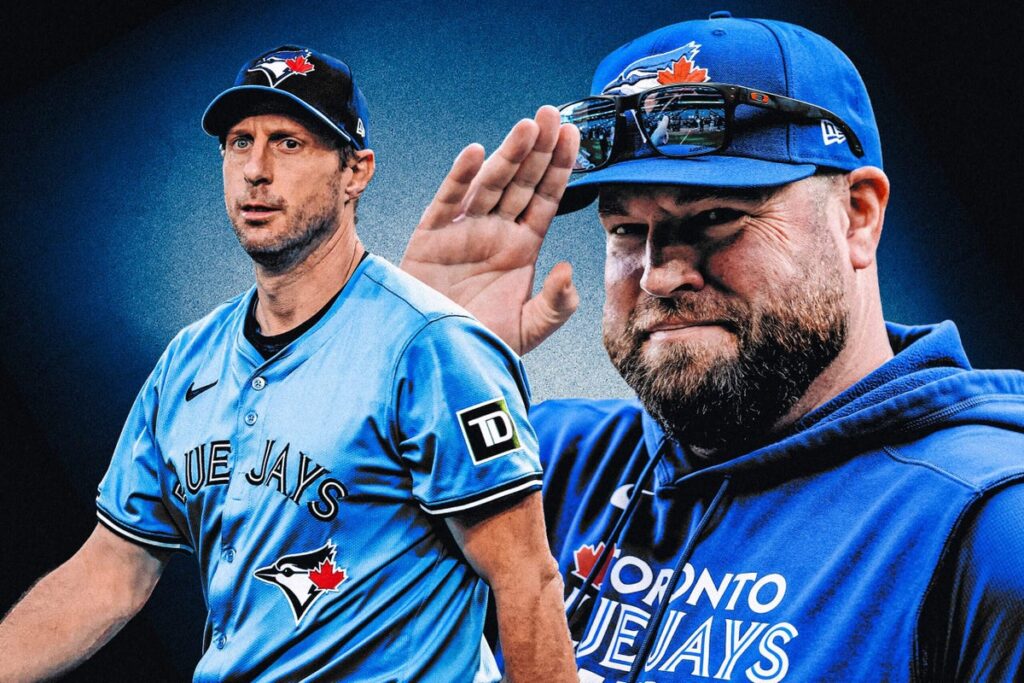Editor’s note: This story is part of Peak, The Athletic’s desk covering leadership, personal development and performance through the lens of sports. Follow Peak here.
It was just a brief comment after Game 4 of the American League Championship Series, lasting 30 seconds or so, but it spoke volumes about the way Blue Jays manager John Schneider views leadership.
After an 8-2 victory over the Mariners, Schneider was talking about his viral encounter with starting pitcher Max Scherzer, the fiery 41-year-old and future Hall of Famer.
Schneider had walked to the mound with two outs in the fifth inning, the Blue Jays leading 5-1. Scherzer responded in usual “Mad Max” fashion, screaming, nodding, staring daggers through his manager as the Toronto infield gathered at the mound.
Schneider quickly headed back to the dugout, telling Scherzer, “I’m leaving you in to execute.”
“I think at that point there’s numbers, there’s projections, there’s strategy, and there’s people,” Schneider told reporters. “So I was trusting people.”
It was a fascinating window into his thought process. But it wasn’t even the most interesting thing he said. It was what he said next.
“I think in that moment, you kind of relive every conversation I’ve had with him over the course of the year,” Schneider said of Scherzer. “And I trusted him to make pitches.”
Last week at Peak, we wrote about how managers use data and intuition to make decisions in the postseason. I spoke to Laura Huang, a professor at Northeastern University, who researches the science of intuition.
We often think of intuitive decision making as impulsive or emotional — landing on a decision without much thought. Huang says that conception is wrong. The reality is actually much different.
Huang believes intuition is better viewed as a process — the subconscious combination of data and experience, or what Huang calls the “vast reservoir of pattern recognition, emotional memory and contextual fluency.”
“Our background, our expertise, our pattern matching, our culture, our background — all kind of combined together that results in a flash of clarity,” Huang said. “It’s this executive summary of the data plus our personal experiences.”
If we’re taking the art of decision-making literally, it’s hard to imagine that Schneider could recall every conversation he’s had with Scherzer since he joined the Blue Jays last season. But what he really seemed to be describing was the process of intuition. In a matter of moments, he combined everything he knew about Scherzer — all his experiences, all their interactions, every piece of personal data — and he made a decision on how to proceed.
From a leadership perspective, it was revealing and fascinating.
Scherzer later surmised, accurately, that Schneider was not actually visiting the mound to determine whether he should remove his starting pitcher from the game. He had already made the decision. He was visiting the mound because he knew it would light a fire in Scherzer, who was ready to fight to stay in.
“I think it was kind of a mind game to kind of get me going,” Scherzer said.
“He always needs to be pushed,” Schneider told The Athletic’s Ken Rosenthal. “I’ve learned that this year. I said, ‘I don’t think you’re f—— good.’ And he goes, ‘I’M F—— GOOD!’ And I went, ‘OK.”
It worked.
Schneider, 45, is in his fourth season as a major-league manager. A career minor-leaguer who rose through the Blue Jays system as a coach, he is preternaturally calm and collected, remaining incredibly relaxed even during those in-game interviews that most managers sprint through.
He preaches a simple message of focusing on each individual day.
“Turn the page and say, ‘What’s important now?’ ” Schneider said.
In this way, he possesses the kind of “soft skills” that define most successful baseball managers, the ability to communicate, collaborate and understand people – traits that translate beyond sports. A recent paper from academics from Northwestern and Seoul National University studied 1,000 occupations across industries from 2005 to 2019 and found that employees who rated high in soft skills like collaboration and adaptability fared better than those who scored high in specialized and advanced skills.
In other words: In a world of expertise, soft skills are a differentiator.
For Schneider and the Blue Jays, it was just one decision in a long postseason. Trailing 3-2 in the ALCS against the Mariners, they face elimination on Sunday night in Toronto.
But the viral moment with Scherzer was more than just good television. It was a perfect illustration of intuitive decision-making in the heat of October.


